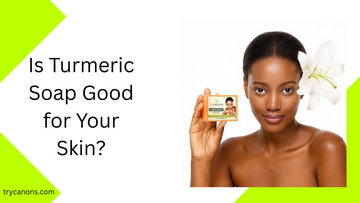Does turmeric help with acne? It’s a fair question—especially since many natural remedies are gaining attention in skincare. At first glance, applying a kitchen spice to your face may seem unusual.
But here’s the thing: turmeric has been used for centuries in Ayurvedic and Eastern medicine. Today, modern research is beginning to support what traditional practices have long suggested—turmeric might actually be one of the best natural ingredients for calming inflamed, acne-prone skin.
In this post, we’ll explore why turmeric for skin is considered effective for acne, how to use it safely, what to expect, and whether a bar of turmeric soap for acne deserves a permanent spot in your bathroom.
What Makes Turmeric Good for Acne?
Turmeric contains curcumin, a natural anti-inflammatory and antioxidant compound. That’s what gives turmeric its bright yellow color—and its skin-soothing properties.
Acne is an inflammatory skin condition. Whether you’re dealing with the occasional hormonal breakout or deeper cystic acne, inflammation plays a major role. That’s where turmeric helps.
Turmeric for skin not only reduces redness but also offers antimicrobial benefits that may fight acne-causing bacteria. It acts as a gentle, plant-based alternative to harsh chemicals often found in traditional acne products. Its antioxidants also protect against environmental damage—like pollution and stress—that can worsen breakouts.
Turmeric Soap for Acne: Worth the Hype?
Let’s talk about that bright orange bar many are considering. Is turmeric soap for acne actually worth it? In a word—yes. But, as with any skincare product, results depend on the formula.
These bars typically combine turmeric with natural oils like coconut, neem, tea tree, or castor, which help cleanse skin without stripping moisture. This balance is important because harsh cleansers can make acne worse by over-drying the skin.
Turmeric soap for acne is also popular for body breakouts on the back, chest, or shoulders. With regular use, it can help calm irritation and even fade old marks over time.
Look for the best turmeric soap for acne that’s sulfate-free, fragrance-free, and made with real turmeric—not just turmeric “color” or fragrance. Note: it may stain washcloths, but your skin will thank you.
Turmeric vs. Traditional Acne Care Products
Most of us have tried traditional acne treatments: benzoyl peroxide that stings, salicylic acid that over-dries, or retinol that peels. While effective for some, these can be too harsh for sensitive skin.
Turmeric for acne offers a gentler, more balanced approach. It won’t burn or clog pores, but it can deliver results with consistent use. This makes it a good option for those with delicate or combination skin types.
The key is patience. Turmeric for skin won’t work overnight, but with 2–3 weeks of regular use, you may notice reduced redness, fewer breakouts, and a natural glow.
How to Actually Use Turmeric for Pimples?

The idea of using a spice on your skin sounds good—until you think about stains. Here are safe and less messy ways to use turmeric for pimples:
-
DIY Mask (Spot Treatment)
Mix a small amount of turmeric with honey and yogurt (or aloe vera). Apply to problem areas for 10–15 minutes, then rinse. -
Turmeric Soap
An easy, everyday option. Turmeric soap for acne integrates seamlessly into your routine without the mess of DIY masks. -
Turmeric Serum or Cream
Many skincare brands now include turmeric extract in serums or creams—perfect for a mess-free option.
Always patch test. Even natural ingredients can irritate sensitive skin.
Can Turmeric Help with Acne Scars and Dark Marks?
Breakouts often leave behind scars or pigmentation. The good news is that turmeric for skin can help fade this over time. Its anti-inflammatory and antioxidant properties promote cell turnover and may improve uneven skin tone.
Pairing turmeric with ingredients like vitamin C or niacinamide can enhance results. Just remember this is a gradual process, not a quick fix.
Also Read More Blog: Does Turmeric Soap Help with Acne?
Can You Eat Turmeric for Better Skin?
Yes—turmeric benefits aren’t limited to topical use. Since internal inflammation can also lead to breakouts, consuming turmeric may help from the inside out.
Try:
-
Golden milk (turmeric latte)
-
Turmeric capsules (with black pepper for better absorption)
-
Cooking with turmeric spice in soups, curries, or smoothies
While it won’t cure acne alone, it can complement a balanced skincare and lifestyle routine.
Lifestyle Factors That Boost Turmeric’s Benefits
Turmeric works best when paired with healthy habits. If you’re using turmeric for skin, consider these supportive practices:
-
Hydration: Drinking enough water helps your body flush out toxins that may worsen acne.
-
Balanced Diet: Reduce processed foods and increase antioxidant-rich fruits and vegetables.
-
Stress Management: Stress hormones can trigger breakouts. Pair turmeric use with meditation, yoga, or journaling.
-
Consistent Sleep: Skin heals at night—good rest enhances turmeric’s natural effects.
These habits maximize turmeric’s impact and keep your skin healthier overall.
The Myths Around Turmeric for Skin

Like any trending ingredient, turmeric for acne comes with myths. Let’s clear a few:
-
Turmeric cures acne overnight → False. It reduces inflammation but requires time and consistency.
-
Only DIY turmeric masks work → Not true. Turmeric soap and serums can be just as effective without the mess.
-
It stains your skin permanently→ Temporary staining is possible, but it fades quickly with washing.
The Downside: What to Know Before You Go Full Turmeric
Before you add turmeric for skin to your routine, keep in mind:
-
Staining is possiblez: Towels, pillowcases, or nails may temporarily pick up a yellow tint.
-
Check ingredients: Not all products are created equal—avoid those with unnecessary additives.
-
Patch test: Natural doesn’t always mean risk-free.
-
Be consistent: Results take time—expect improvements after regular use, not instantly.
Ready to Glow Naturally?
So, does turmeric help with acne? The answer is yes. Whether you’re managing hormonal breakouts, cystic acne, or occasional pimples, turmeric for skin offers a gentle, plant-based solution worth trying.
The best part? You don’t need a complicated skincare routine. Sometimes, the simplest natural remedies can make the biggest difference.
FAQs:
-
Does turmeric fight acne?
Yes. Turmeric contains curcumin, which reduces inflammation and bacteria—two major causes of acne. It also calms redness and swelling from breakouts.
-
Can turmeric get rid of acne scars?
Turmeric helps fade acne scars and dark marks by supporting skin healing and reducing pigmentation over time. Results are gradual but natural.
-
Does turmeric bar soap help with acne?
Absolutely. Turmeric soap for acne gently cleanses while reducing inflammation. It works well on both facial and body acne.
-
How to clear acne with turmeric?
Use turmeric in masks, serums, spot treatments, or soap. Consistency matters—pair with a good skincare routine for best results.
-
Can turmeric soap remove pimples?
Yes. Many find that turmeric soap for acne helps reduce pimples with daily use. It’s especially effective for oily or combination skin.
Read More Blog:







